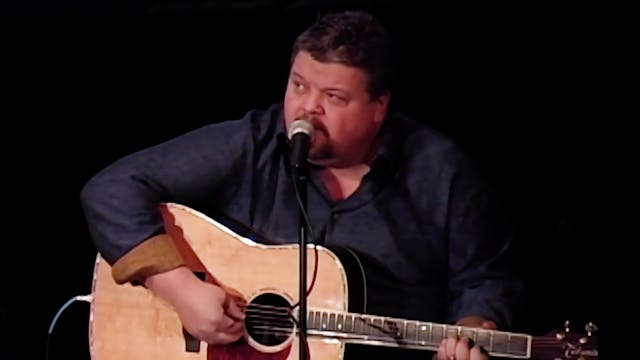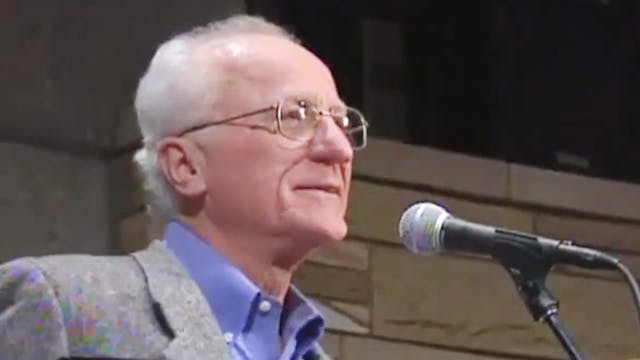Eddie Bayers • Nashville Cats, 2010
Just Added
•
1h 14m
Eddie Bayers—whose studio credits include classic hits by Rodney Crowell, The Judds, and George Strait—describes close calls and setbacks that he endured prior to becoming one of Nashville’s most prominent drummers.
Held on February 13, 2010, the program is part of the Country Music Hall of Fame and Museum Museum’s Nashville Cats series, designed to showcase stories and songs from session musicians who have played important roles in country music history.
Born in Patuxent River, Maryland, Eddie Bayers moved often early in life, as the family followed his father, a U.S. Navy fighter pilot and officer. The family relocated to California, then to North Africa, eventually settling in Nashville in 1959 when then-ten-year-old Bayers’s father retired. It quickly became evident, Bayers shares, that his father struggled to adjust to life outside the military.
“As our warriors often do, the culture shock after thirty years of military service, then coming back into civilization, was a shock to him,” Bayers says. “He sort of went awry, and he basically left the family and started another family.”
By then, Eddie Bayers had begun exploring music, first as a keyboard player. His father had encouraged him to take formal training starting at age seven, after seeing the budding musician play with chords on a piano.
When Bayers was sixteen, his mother and sister were killed in a collision with a drunk driver. To avoid becoming a ward of the state, he moved to New Jersey at the invitation of a musician friend, who knew a rock band that was seeking an organist. “I said, ‘Well, I’m the guy,’” Bayers recalls.
Bayers played in clubs along the Jersey shore, but when the band broke up, he was left without an income, and slept on the beach and on rooftops, panhandling to pay for food. A local club owner allowed Bayers to play during the day, which offered the young musician extra practice time, and led to an invitation to join a show band, Big Bear Revue.
A member of the band Checkmates, Ltd., who saw Bayers switching between the Hammond B-3 organ and the drums with the Revue, recruited him to Las Vegas, where Checkmates became a top draw. Bayers later moved to Oakland, California, where he played with the Edwin Hawkins Singers, and then returned to Nashville in 1974, at first living in his car in a rest area outside of town.
An audition to play piano at the Carousel Club in Printer’s Alley in downtown Nashville moved his Music City path forward. Larrie Londin, who played drums in the club’s quartet, hired Bayers on the spot, and got him on his first Nashville sessions, which led to more.
Among the many high-profile projects Bayers talks about during his Musician Spotlight: the earliest sessions for The Judds—when producer Brent Maher thought he was producing demos for a new mother-daughter duo, Naomi and Wynonna Judd; Country Music Hall of Fame member Alan Jackson’s first album, “Here in the Real World”; and Rodney Crowell’s standout “Diamonds & Dirt” album, which produced five #1 singles.
“If there’s anything I can say for that, it’s that I want the inspiration to come from the artists and their songs,” Bayers says. “I want to be their drummer. I tell them, ‘I know some things about drums, but whatever ideas you have, I want to hear them. I’m not bringing the last successful effort I had in with me. This is your record; I want to be your drummer.’”
Bayers also discusses a serious wrist and hand injury from a motorcycle accident that took him out of the studio for six months. He cites four people who helped him pull out of it: producers Steve Buckingham and Brent Maher, Rodney Crowell, and Vince Gill.
Program host Bill Lloyd talks about Bayers’s versatility and speaks about his work in the Notorious Cherry Bombs (with Crowell and Gill), and as a featured player in the Grand Ole Opry house band. Bayers talks about his work in Nashville and Boston with the Berklee School of Music, and about his recording studio, The Money Pit.
To end the program, Bayers joins Rodney Crowell for a guitar-and-snare-drum version of the song “Many a Long and Lonesome Highway.” Bayers then moves to the piano and accompanies his wife, Lane Brody, on vocals, and Kristin Wilkinson on viola, for Brody’s “Go Quickly By.”
FOR MORE
Explore the Museum’s public programming: https://countrymusichalloffame.org/plan-your-visit/exhibits-activities/public-programs/
FOLLOW THE MUSEUM
Instagram: https://www.instagram.com/OfficialCMHOF/
Facebook: https://www.facebook.com/countrymusichof/
Twitter: https://twitter.com/countrymusichof
Up Next in Just Added
-
Craig Wiseman • Poets and Prophets, 2007
Craig Wiseman shares insights from his songwriting career and sings some of his biggest hits—including 2004 Tim McGraw chart-topper “Live Like You Were Dying” and award-winning Brooks & Dunn single “Believe”—during a Poets and Prophets program at the Country Music Hall of Fame and Museum.
He...
-
Story of the Gretsch Guitar • Present...
During this multimedia presentation, Gretsch Company president Fred W. Gretsch, executive vice president and CFO Dinah Gretsch, marketing specialist Joe Carducci, and thumbpicker Joe Hudson share the stage to trace the history of the innovative guitar maker. Held June 24, 2016, the event was pres...
-
Bob McDill • Poets and Prophets, 2008
Bob McDill shares memories from his lengthy career as a hit country songwriter and offers insights into classic hits he’s written for Alabama, Dan Seals, and Don Williams during this Poets and Prophets program, held March 1, 2008, at the Country Music Hall of Fame and Museum.
Texas native McDill...



